Are you a lousy swearer in this frustrating world where profanity is the sole refuge of the times? Turn to Shakespeare. There is not a sharper tongue than the Bard's himself. Is there? Methinks not. (Forget Malcolm Tucker— he is on a completely different level). Almost 198 pieces are attributed to Shakespeare, including 154 sonnets, six long poems, and around 38 plays. He also invented a string of words and phrases that we all still use today. However, no one can forget the enormous number of cuss-words and insults that Shakespeare has so kindly and so generously contributed through his plays. Shakespearean profanity is in a class by itself. Extracted from these are some of his juiciest, sharpest, most colourful burns that can sear your ally’s bottoms like anything. Ready for some Elizabethan vilification?
If you have nothing nice to say, say it like the master of put-downs!
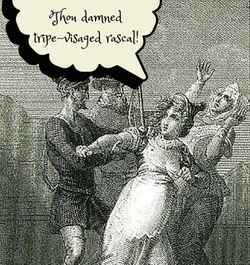
1. “Thou damned tripe-visaged rascal!”: Henry IV, Part II
In Henry IV, Doll Tearsheet in her fit of temper lashes this out at the first Beadle as he arrests her, calling him a scoundrel with a face resembling tripe. Being told your face looks like offal? Priceless!
2. “Out, you mad-headed ape!”: Henry IV, Part I
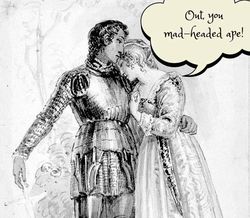
Henry IV is chock-full of such flaming insults. Here Kate, Lady Percy, says this to her husband Hotspur, calling him a crazy fool and belittling him in the worst possible way. She knows that her husband hasn't been sleeping with her, and has been preoccupied with something. She wants to know what is carrying him away. Hotspur chooses to use sarcasm to answer her, saying “Why, my horse, my love, my horse”. And then he ignores her to discuss horses with a servant. Is there then any amount of surprise why Kate cusses at him? That's what you get for being a jerk of a husband who cracks a bad joke when your wife asks you a serious question!
3. “Away, you scullion, you rampallion, you fustilarian!; I’ll tickle your catastrophe!”: Henry IV, Part I
Falstaff, in Henry IV, can be seen shouting out to Mistress Quickly (aka Doll Tearsheet) calling her all sorts of names like a worthless scoundrel, a kitchen wench and a fat old hag. On top of all this, he also tells her he’ll tickle her catastrophe, meaning, “I’ll kick your arse”. Why do I feel tickling someone’s catastrophe sounds way more eloquent? That’s how you swear at a lady!
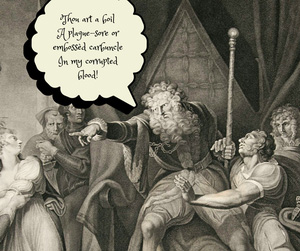
4. “Thou art a boil; A plague-sore or embossèd carbuncle; In my corrupted blood.”: King Lear
King Lear did start off with a mild “I prithee, daughter, do not make me mad. I will not trouble thee, my child,” and then suddenly goes on to say that she, his daughter Goneril, is a disease in his flesh, a sore and a nasty pustule in his blood. He is then quick to take back all the insults in the very next line—but well, once it’s thrown, it’s thrown isn’t it?
5. “I was seeking for a fool when I found you.”: As You Like It
As You Like It has a fine battle of wits between Jaques and Orlando, where Jaques utters this burn, and Orlando then crushes him with this answer, “He is drown’d in the brook. Look but in and you shall see him.” You’d think Jaques has the last laugh, but Orlando is the man of the hour here with his sarcasm and well-aimed blows all leading up to his parting lines, calling Jaques ‘Monsieur Melancholy’. I have to mention Jaques does think that Orlando’s wit is quick, and made of Atlanta’s heels. The repartee is joyous to read, to say the least!
6. “Thou elvish-mark'd, abortive, rooting hog”: Richard III
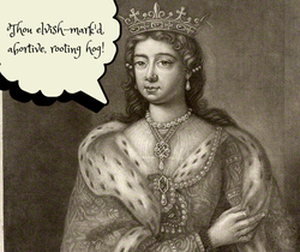
Get those earplugs out, kids—this bitter rain of insults between Queen Margaret and Richard of Gloucester is an event in itself. Margaret, a foul-mouth by character, at first lashes out at Queen Elizabeth, Hastings, Rivers and Dorset. But then saves the worst curses—the nastiest ones—for Richard after he calls her a foul-wrinkled witch. She says Richard is an inhuman, bestial, deformed, premature-born, rooting hog. A "slave of nature”, and “the son of hell," a "slander of thy mother's heavy womb”, and the “loathed issue of thy father's loins.” He is a birth defect, and an insult to his mother's womb. Ouch!
Let me add another favourite exchange here (They doth hate each other with such passion!)
Richard: “I cry thee mercy, then, for I did think
That thou hadst called me all these bitter names.”
Queen Margaret: “Why, so I did, but looked for no reply.
O, let me make the period to my curse!”
Richard: “'Tis done by me, and ends in “Margaret.”
7. “The tartness of his face sours ripe grapes”: Coriolanus
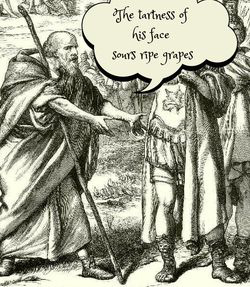
Menenius, who is gifted with great wit, prefers to describe his friend Coriolanus in battle this way. What an insult to have your face to be described being too tart that it turns even ripe grapes sour!
8. “Why, thou claybrained guts, thou knotty-pated fool, thou whoreson, obscene, greasy tallow-catch”: Henry IV, Part I
Quite illustrative, I must say. This tirade of onslaughts is hurled towards Falstaff by Prince Henry. A clay-brained son of a whore, and an obscene lump of fat, that's what Falstaff is! After this, clearly showing the prince's rhetorical skills are his further visual insults that describe Falstaff as a 'sanguine coward', a bedpresser, a horse-back-breaker, and a huge hill of flesh. If you start deconstructing these snubs, you'd never ever want to be in Falstaff's shoes. There is no dignity left in being. Whatsoever.
9. “Methinks, thou art a general offence, and every man should beat thee.”: All's Well That Ends Well

Lafeu, our feisty old nobleman, detests the phony, witless Parolles and his over-dressing. In fact, he is so disgusted and angry at how pretentious Parolles's clothes are that Lafeu would like him to be given a good beating. The boastful Parolles probably deserves this one, since Lafeu has a point about his dandy and outlandish dressing sense, that sort of says oodles about Parolles's character (“The soul of this man is in his clothes”).
10. “When I know not what else to do, I'll see thee again”: The Tale of Timon of Athens
Timon's put-down above is followed by Apemantus's retort, “When there is nothing living but thee, thou shalt be welcome.” Apemantus's hobby is being crabby and hating everything around him including Timon, the wealthy dude whose hobby is giving away money and gifts to his friends. Timon of Athens is also sprinkled with burns like, “Were I like thee, I'd throw away myself”, “I'll beat thee, but I should infect my hands”, “I do wish thou were a dog, that I might love thee somthing” and “Would thou were clean enough to spit on.”
Shakespearean insults that would still work in today's times:
•Fit to govern? No, not fit to live.
•Your sole name blisters our tongue.
•Out of my sight! Thou dost infect my eyes.
•Thou art unfit for any place but hell.
•More of your conversation would infect my brains.
•You speak an infinite deal of nothing!
•You of basest function!
•I do desire we may be better strangers.
•Pray you stand farther from me.
•Alas, poor ape, how thou sweat'st.
•Villain, I have done thy mother!
•Let's meet as little as we can.
So if profanity is your most favourite pursuit, you know where to go. Simply go read a play of Shakespeare, and learn the art of insulting from the master. Remember to use sparingly. And since this is a Shakespeare dedication piece, I beg thy pardon for my approaching farewell lines and my choice of words. So long you scurvy companion, you lack-linen mate!
Away, you mouldy rogue, away!







